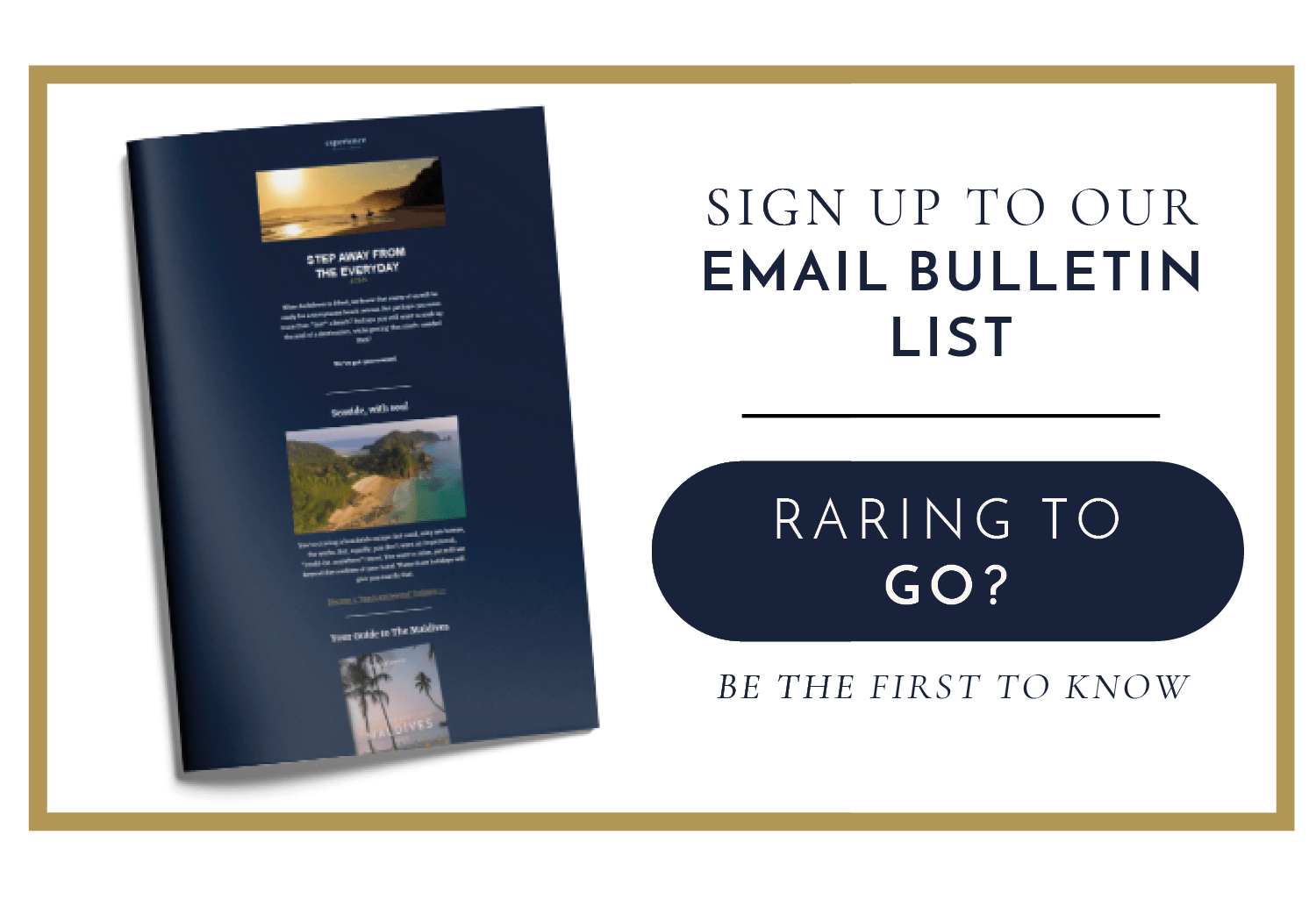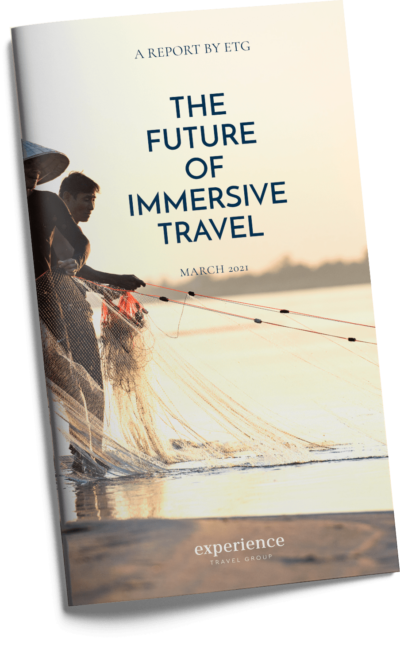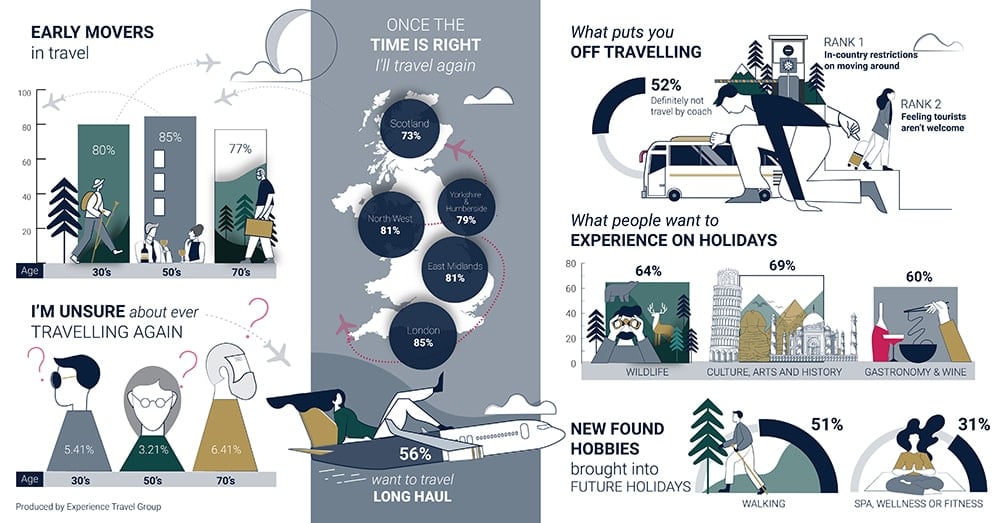
Has lockdown altered appetite for luxury travel forever?
Is the appetite for luxury travel still there following a year of lockdown-induced stress? With the government suggesting that international travel will re-start on the 17th May (subject to review), we looked to a recent survey* by AITO, the Specialist Travel Association, for some insights.
The resounding answer was a great deal, with 89% of respondents saying they would take the same or a higher number of holidays once travel was safe again. In fact, just over a quarter of these said they would take more holidays than before the pandemic. In some more good news for the world economy (tourism is estimated to account for 10% of world GDP), 23% of people expect to spend more on their main holiday than they did, while only 6% said they would spend less.
People in the East Midlands show the biggest increase in the holidays they plan to take post-pandemic
If we dive into the data a little, we see there are sharp regional variations in the levels of appetite for luxury travel around the UK. The East Midlands is showing the biggest net increase in the number of holidays they plan to take ‘once travel is safe again’, with 82% saying they will take the same number of holidays, or even more. Considering the survey was conducted in January and early February, when demand for booking holidays was at rock bottom, this percentage is surprisingly high.
Londoners will be first to get away on holiday
Among those showing the most appetite for travelling soon (‘among the first’ or once ‘the time is right) London had the biggest share with 85%. Other English regions were quite consistent with 81% in East Midlands, the North West and East of England and 80% for West Midlands, Yorkshire and the Humber and the South West.
Scottish People Are More Cautious
By contrast, among Scottish people surveyed, only 11% put themselves amongst the ‘first to travel again’ group, compared to 17% of people in the East Midlands or 15% of people in London. That said, Scottish people were equally as keen to travel once ‘I know it’s safe’ so perhaps this simply reflects the more cautious messaging from Holyrood compared to Westminster.

Those aged between 50 and 59 are showing the most appetite for luxury travel soon
Divided by age we saw similar variation, but with certain surprising results. The assumption might have been that the younger respondents would be most keen, but the data did not quite bear that out.
According to the data, those aged between 50 and 59 were more likely to be early movers than any other age group (excluding those under 21): 85% of those in their 50’s hoped to travel soon, compared with 80% of those in their 30’s. Those aged 60-69 and 40-49 also showed more appetite for travel soon than those in their 30’s, with 82% and 83% respectively.
Pouring scorn on last year’s predictions that people over 70 would be permanently put off travel, 77% of people in the 70-79 bracket said that they would travel again. In fact, only 6% of those in their 70’s said that they were unsure about travelling again. Perhaps surprisingly, this is only marginally higher than 30-39-year-olds, 5% of whom answered, ‘I’m unsure about travelling again’. We don’t have any theories as to why such a comparatively high proportion of those in their 30’s are taking a very cautious approach, but there is a marked reluctance here!
This may well be an over-generalisation, but at ETG, we’ve always said that those aged 50 and above are extremely adventurous around their travel choices. Perhaps it’s that people want to see the world before they ‘settle down’; perhaps it’s a by-product of kids having left the nest; it could be, as many travellers have told us, that they’re making up for travels not taken in their youth. In any case, this data certainly seems to support what we’ve always suspected: that the over-50 age group have an acute sense of curiosity.
Data & Method
*This data was taken from a survey of 20,000 travelling members of the public, conducted by our travel association, AITO. AITO travellers tend to be a discerning, wealthy group, who enjoy discovering new destinations and cultures and are disproportionately concerned about the positive impact of their travels. This survey was representative of the type of people who take immersive holidays around the world, but not the population at large.
Many AITO tour operators distributed this survey via email, social media and other platforms. The survey ran throughout January and February 2021.
A Deeper Dive: The Future of Immersive Travel
As part of the survey, we asked our own clients to take a deep dive into what travel may look like in the future. We also asked questions to discover whether their values and attitudes towards travel had changed. Finally, we wanted to know whether people were seeking a different type of travel now compared to BC (Before COVID).
For context: while ETG clients are a diverse bunch, they are very much luxury travellers – not necessarily in the sense of 5* hotels and champagne (though nothing wrong with that!), but in that they enjoy experiences that make their travel worthwhile. Therefore, the below statistics refer specifically to this kind of experiential travellers.
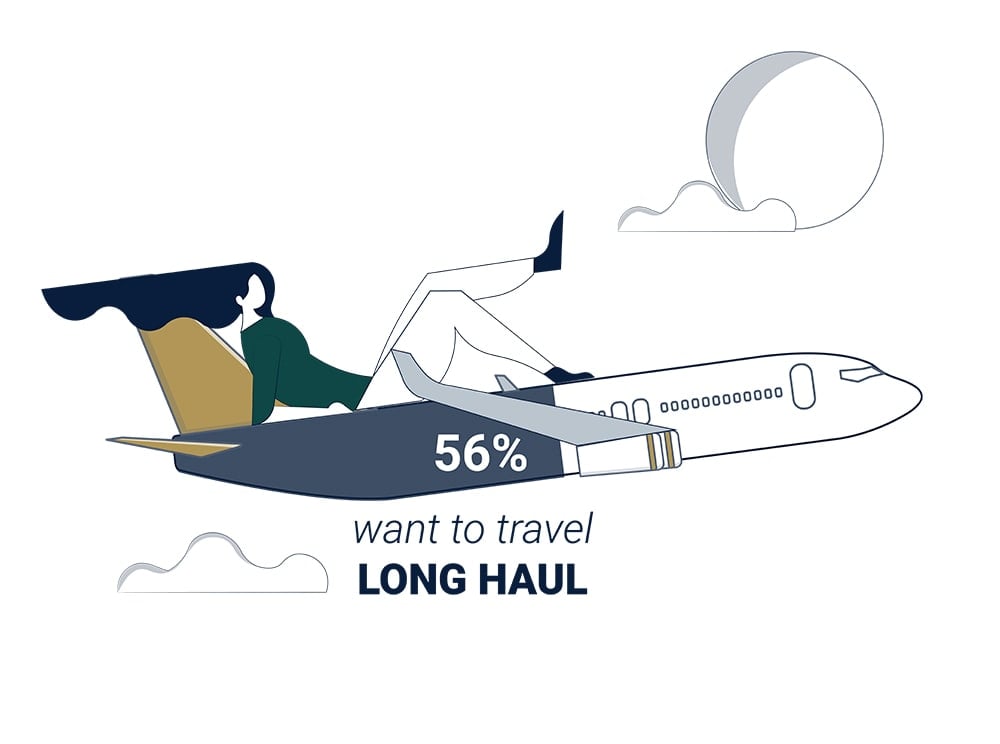
Making travel happen again
We’ve already explored how there is pent up demand with the appetite for luxury travel still very much there. Among ETG’s sophisticated survey respondents, this demand was even more pronounced, with 91% saying they would take the same number or more holidays than before the pandemic. But what type of travel? And where to?
First of all, as an Asian specialist, we were encouraged to see that there was plenty of demand for long haul travel. 56% of respondents said they were likely to travel long haul within the next 12 months. Southeast Asia emerged as the most sought-after region, but India and Sri Lanka commanded significant interest too. So it seems it’s not all staycations and short-haul in the luxury travel space…
It is clear from the data that the appetite for luxury travel is still as important as ever amongst travellers. 87% agreed with the statement ‘holidays are an essential part of my lifestyle’ (with 50% ‘strongly agreeing’). A further 83% said that they enjoy the anticipation of planning a holiday. This shows that it’s our job as travel companies to make that happen for our clients: we might not be saving lives, but we can make an appreciable difference to people’s lifestyle and wellbeing.
We also asked respondents what it would take for them to start happily planning and taking holidays again. Unsurprisingly, top of the list was having had a vaccination, closely followed by not having to quarantine on return and the availability of travel insurance. The least of the issues was that the accommodation providers had clear Covid protocols. This likely reflects the fact that people would not see themselves as ‘at risk’ once they have had a vaccination.
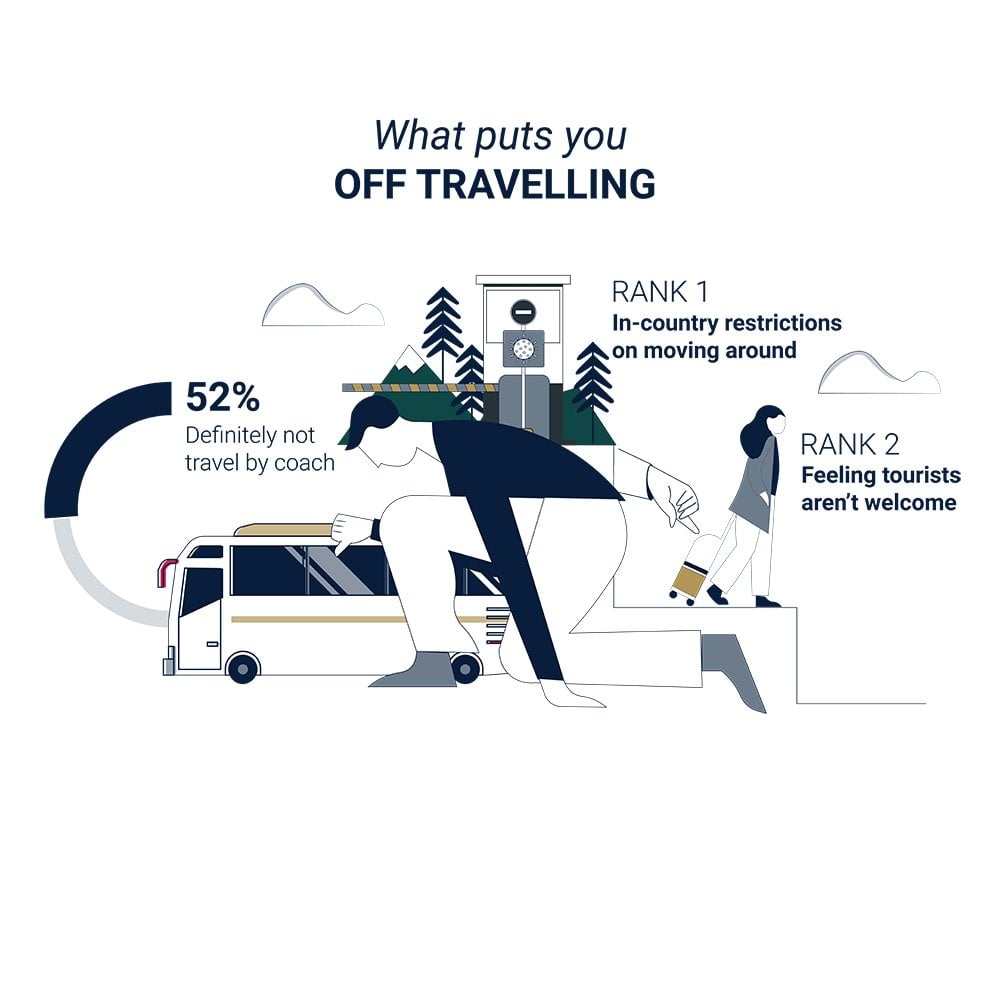
Which in-country factors would be potentially off-putting? ‘Restrictions on movement’ and the ‘feeling that tourists are not welcome’ came up as top concerns, more so than wearing a mask or local vaccination rates. We noted that 52% of respondents said ‘definitely not’ to the idea of travelling by coach, though by contrast, only 3% of people said that would ‘definitely not’ travel by air. A clear majority of 71% said they would ‘definitely’ or ‘probably’ take a flight within the next 12 months. The attitude seems to be that luxury travellers won’t let Covid get in the way of travelling, but seek to minimise any unnecessary risks in the destination.
Our most important job as tour operators has always been to ensure the safety, as well as the enjoyment, of our travellers. Mitigating risks is what we do – and with Covid, it’s no different. We see it as our duty to organise all measures pertaining to Covid-safe travel, whether that’s arranging PCR tests, communicating protocols or recommending quality travel insurance with robust Covid-cover.
Above all, we need to remove the risk from planning and booking future travel as far as we can. Our ‘Book with Confidence’ guarantee outlines how we do this.
How can we help make our customers’ travel count?
Arranging logistics is an important job. However, our true purpose as a travel company is to help travellers make their experiences count, both for themselves and for the destination.
We are pleased to see that this type of immersive experience is still very much at the forefront of people’s minds. In fact, 77% of respondents agreed that they would pay more for a better holiday experience.
It was curious to us – and yes, our bias is evident – that only 48% of recipients said that they would book with a specialist tour operator in the next 12 months. Granted: many people won’t be booking complex trips in that time. Yet we still expected a year of getting stranded abroad, endless insurance claims and futile attempts at refunds from cancelled travel plans, to have swayed at least half the population that a tour operator might be useful….!
In all seriousness, we know from talking to many clients that the hesitation to book with an operator often stems from the desire to be more ‘free’ when travelling. We completely get that: each member of the ETG team knows the magic of spontaneous travel encounters. But we believe that by taking you to the best places (away from the crowds), with the best people (insightful, local guides), we create the conditions for those special moments. And when all that comes with 24-hour back-up, and the promise to fight your corner with airlines, arrange your transport and do all the safety scanning so you don’t have to…
(Ok. Pitch over!)
We were interested to see that 39% of respondents are concerned about their carbon footprint. At ETG we think a great deal about our carbon footprint and how we can minimise the negative impact of travel and maximise its societal, economic and environmental benefits. To that end, you can read about our carbon contribution scheme as well as our more general approach to sustainability.
One key change we picked up was that travellers are much more likely to use their holidays to spend time or visit friends and family. An amazing 49% of respondents said they would prioritise visiting friends and relatives. After a year of enforced absence, this makes a great deal of sense and arranging a shared holiday is an amazing way to do this. One of our all-time favourite holidays to organise was a huge family get-together in Sri Lanka, with parties coming from Canada, Australia, the UK, France and Singapore. They all stayed in a group of luxury, fully-staffed villas for a week of fun and connection, before heading off in smaller groups to explore the country in their own way.
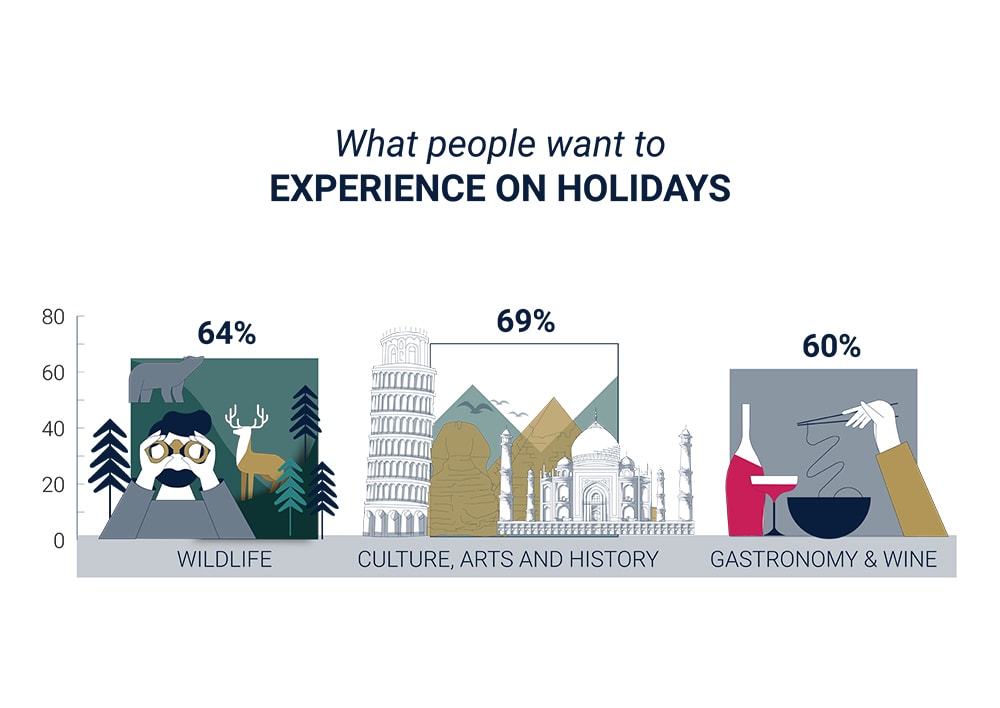
Has what we want from holidays changed?
In this brave new post-pandemic world (when we get there), what do you want from your holidays? There were many predictions in the past year about people wanting ‘bio-secure’ bubbles, remote destinations only and a generally hermetically sealed travel experience.
Our survey did not seem to back that up. There was plenty of appetite (pun intended) for street food tours and eating at street food markets as well as exploring cultural sites.
What people wanted to experience and see on holiday was similar to what we have found in previous surveys, but with some interesting areas of growth. As ever, the big three given as potential ‘main focus’ of a holiday: wildlife (64% positive), exploring culture, arts and history (69%) and gastronomy and wine (60%). Nothing hermetically sealed there. Walking and trekking make an appearance at a very high 55%. This reflects new-found walking habits formed during the recent lockdowns as 51% said they were probably or definitely more likely to introduce walking into their holidays post-pandemic. 31% of respondents said that they were more likely to bring in spa, meditation or wellness treatments and 20% said they wanted to do more yoga on holidays. This desire for relaxation makes total sense after a year of lockdown stress, but we also like the sound of this active participation in your holiday – to our minds, that’s where the magic of travel often lies.
Something that could be a lasting trend from Covid is an interest in slower, more pared-back travel. 27% of people said that they would be more likely to take travel in a slower, simpler way, with fewer stops and less transit. We have long been banging the drum for this kind of travel, believing it to be better for the environment as well as lead to a more enriching travel experience. Long may it last!
In response to the evident shift in the way we travel, ETG launched our Revitalise Collection which we think is squarely on these trends. Each of the 18 holidays features just two stops in a single country, in various destinations across Asia (including Sri Lanka, India and Indochina). The idea is that by choosing the right hotel in the right location, you can still experience the magic of a country, without the need to rush around and tick all the boxes. It’s good, right?
SO… What does the future of immersive travel hold?
For us, the results show that travel, and in particular, luxury experiential travel, is far from finished. Thank God for that!
It is clear that certain age groups, and certain regions of the country, have different approaches when it comes to the future. The biggest overall surprise may be the comparative hesitance of those in their 30s to resume travel, while those in their 50s have the keenest appetite for it. Geographically speaking, the fact that Scots are more cautious than those in the rest of the UK stands out as significant, as does the fact that Londoners most keen to be the first out of the country.
However, when it comes to what we want out of travel, and the meaning of travel in our lives, it appears that the pandemic has not fundamentally altered us, but brought our existing desires into sharper focus. Travellers remain travellers at heart; and it seems that 2020’s dark predictions of fear and elective lockdowns, have not come to pass among this group.
These are our takeaways from the survey. But we hoped to present the results in such a way that you can draw your own conclusions, too. If you have made it this far, you are clearly interested in the world of travel and what the future may hold; we hope that, like us, you are heartened by these findings, and believe there is a future for immersive travel.
We would be delighted to discuss the survey results with you in detail – please don’t hesitate to get in touch if you have any questions or points to discuss – we’d be grateful to hear what your appetite for luxury travel is now.
Thank you for reading. Stay curious.
GET IN TOUCH
To talk to a member of our team about the survey, you can reach us on 020 7924 7133 or via email.


